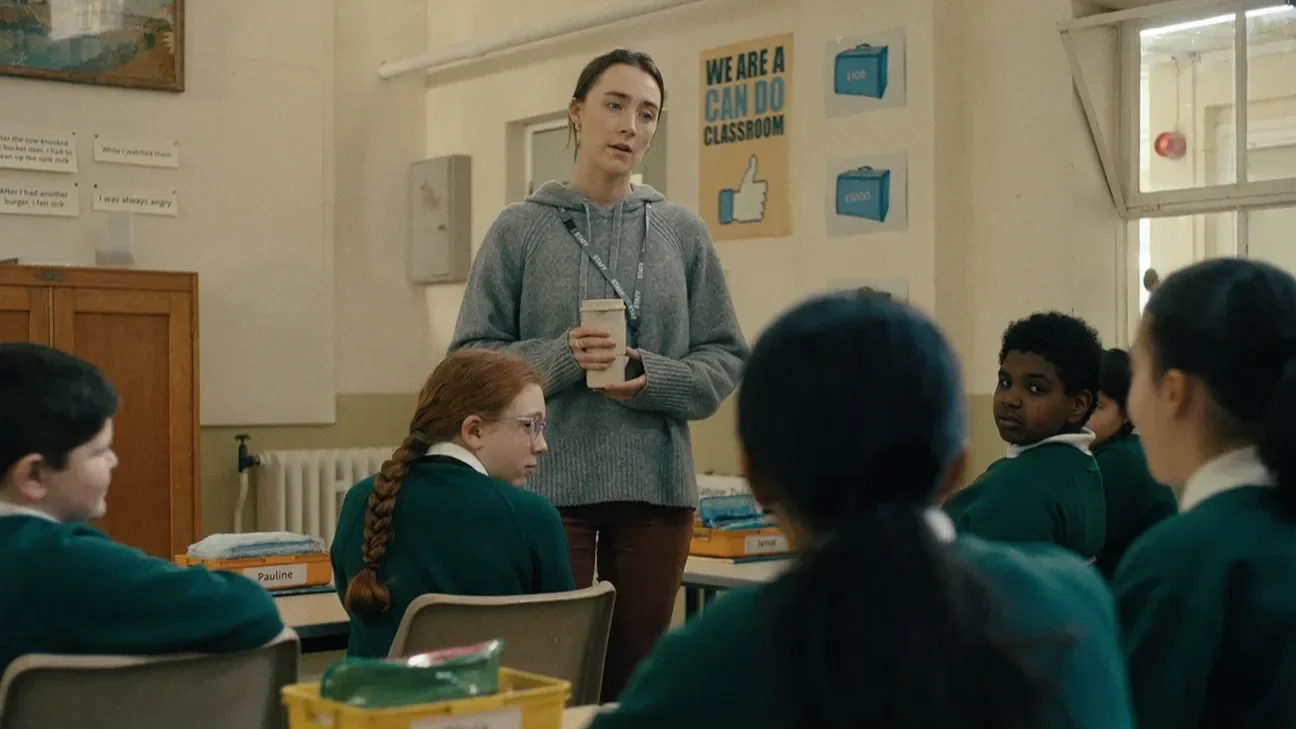TIFF '25: Bad Apples
Maria’s having a hard time. Her ex left her for another woman after she moved towns and jobs to accommodate his own career; she’s on thin ice with the principal of the primary school they both work at; and her classroom is plagued by a young menace named Danny, who cusses her out in front of the other kids and starts fights at the slightest provocation. It’s enough to drive anyone to extremes, and that’s just the stage set by director Jonatan Etzler and writer Jess O’Kane in their new dark comedy, which had its world premiere at the Toronto International Film Festival. Helmed by Saoirse Ronan as the teacher who takes matters into her own hands, Bad Apples takes a satirical bite out of education.
The movie opens on Danny (Eddie Waller) disrupting a class tour of the local apple cidery, introducing a visual motif that’s used to varying effect throughout the film and immediately setting him up as the thorn in Maria’s side. At school the next day, Danny’s troublesome antics ramp up to the point where he pushes teacher’s pet Pauline (Nia Brown) off the stairs, leaving Maria to get berated by Pauline’s parents and Principal Sylvia (Rakie Ayola). Danny’s own father is a noticeably absent single parent, working a grueling delivery driving job and leaving Danny to his own devices—and after Danny turns violent against Maria, too, a twisted turn of events results in Maria locking him in her basement.
Taking a page from the kind of Scandinavian satire honed by Ruben Östlund, the movie doesn’t shy away from moments of brutal humor. When Danny at first tries to escape through brute force, Maria googles how to care for a large pet and ends up buying a harness to keep Danny contained. When she asks her classroom if anyone’s feeling sad about Danny’s disappearance, she’s met with crickets. It’s gleeful in its sendup of how teachers, underpaid and overworked, are expected to play triple roles of educator/parent/counselor. And as Danny stays locked up in Maria’s basement, her own life begins to brighten: her classroom now peaceful, her principal appeased by good evaluations, and even her ex paying her more attention. Maria has more time to spend with her students, including the ever-present Pauline, and even manages to settle into something of a routine with Danny as weeks pass.
As Maria, Ronan strikes a balance between earnestness and a somewhat brutal survival instinct: sure, Danny’s father is grief-stricken and sleepless over his missing child, but Maria assuages her own guilt by outfitting her basement with toys and video games and convincing herself he’s better off with her anyway. Ronan manages a tricky feat of making a character who, in all honesty, kind of sucks into one who’s weirdly easy to sympathize with—whether she’s dissociating with a farming simulator game in the home she bought with her ex or coming into her own as a teacher in a post-Danny world.
As Maria’s web of lies gets harder to maintain, so does the plot. Teacher’s pet Pauline, delightfully played as a precocious yet menacing little girl by Brown, starts to close in on Maria’s secret, blackmailing her for overt favoritism at school. Danny himself undergoes a redemption arc as he finally receives personal care and attention and learns how to manage his worse impulses. Both character shifts are made believable thanks to strong performances from Brown and Waller, who more than hold their own in scenes with actors three times their age. But the movie seems to waver between leaning into its nastier, darker elements or shaving off its edges. There are moments of real sentiment between Maria and Danny as they grow closer over the course of the movie, but that’s always undercut by the knowledge that she’s quite literally his abductor.
This indecisive point of view makes the back half of the movie move somewhat ungracefully. Still, while its meandering results in the parts being greater than their whole, Bad Apples deserves extra credit for leaning into the discomfort it creates and mining comedy out of our own darker impulses.
If you enjoyed this article, please consider becoming a patron of Hyperreal Film Journal for as low as $3 a month!


Alix is the editor-in-chief for Hyperreal Film Journal. You can find her on Letterboxd at @alixfth and on IG at @alixfm.